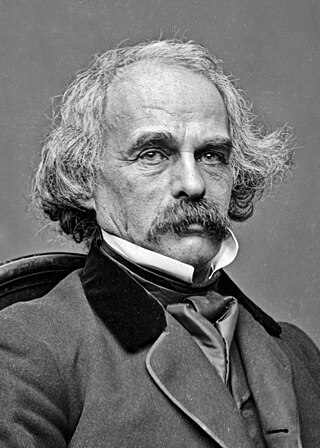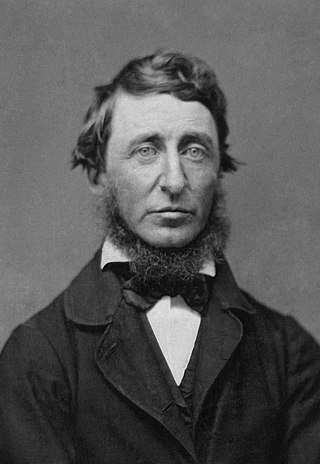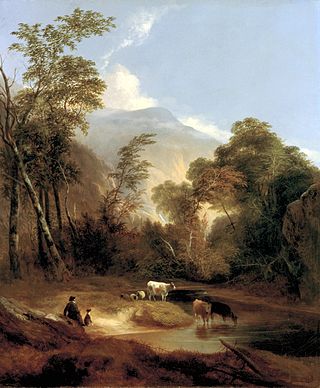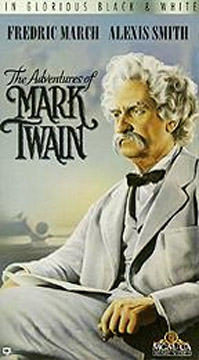
Adventures of Huckleberry Finn is a novel by American author Mark Twain, which was first published in the United Kingdom in December 1884 and in the United States in February 1885.

Nathaniel Hawthorne was an American novelist and short story writer. His works often focus on history, morality, and religion.

Henry David Thoreau was an American naturalist, essayist, poet, and philosopher. A leading transcendentalist, he is best known for his book Walden, a reflection upon simple living in natural surroundings, and his essay "Civil Disobedience", an argument in favor of citizen disobedience against an unjust state.

The pastoral genre of literature, art, or music depicts an idealised form of the shepherd's lifestyle – herding livestock around open areas of land according to the seasons and the changing availability of water and pasture. The target audience is typically an urban one. A pastoral is a work of this genre. A piece of music in the genre is usually referred to as a pastorale.
American studies or American civilization is an interdisciplinary field of scholarship that examines American literature, history, society, and culture. It traditionally incorporates literary criticism, historiography and critical theory.
John William Ward (1922–1985), was the 14th President of Amherst College, a veteran of World War II, Professor of English and History at Princeton University, and Chairman of the Ward Commission.

Francis Otto Matthiessen was an educator, scholar and literary critic influential in the fields of American literature and American studies. His best known work, American Renaissance: Art and Expression in the Age of Emerson and Whitman, celebrated the achievements of several 19th-century American authors and had a profound impact on a generation of scholars. It also established American Renaissance as the common term to refer to American literature of the mid-nineteenth century. Matthiessen was known for his support of liberal causes and progressive politics. His contributions to the Harvard University community have been memorialized in several ways, including an endowed visiting professorship.
The American Renaissance period in American literature ran from about 1830 to around the Civil War. A central term in American studies, the American Renaissance was for a while considered synonymous with American Romanticism and was closely associated with Transcendentalism.

The Adventures of Mark Twain is a 1944 American biographical film directed by Irving Rapper and starring Fredric March as Samuel Clemens and Alexis Smith as Twain's wife Olivia. Produced by Warner Bros., the film was nominated for three Academy Awards, including that for Best Music for Max Steiner's score. Irving Rapper was hesitant to direct the film but was persuaded by Hal B. Wallis.

Van Wyck Brooks was an American literary critic, biographer, and historian.
Richard Warrington Baldwin Lewis was an American literary scholar and critic. He gained a wider reputation when he won a 1976 Pulitzer Prize for Biography or Autobiography, the first National Book Critics Circle Award for nonfiction, and a Bancroft Prize for his biography of Edith Wharton. The New York Times called the book "a beautifully wrought, rounded portrait of the whole woman, including the part of her that remained in shade during her life" and said that the "expansive, elegant biography ... can stand as literature, if nothing else."
Leo Marx was an American historian, literary critic, and educator. He was Professor of the History and Philosophy of Science at the Massachusetts Institute of Technology. He is known for his works in the field of American studies. Marx studied the relationship between technology and culture in 19th and 20th century America.
Ecocriticism is the study of literature and ecology from an interdisciplinary point of view, where literature scholars analyze texts that illustrate environmental concerns and examine the various ways literature treats the subject of nature. It was first originated by Joseph Meeker as an idea called "literary ecology" in his The Comedy of Survival: Studies in Literary Ecology (1972).

The sociology of culture, and the related cultural sociology, concerns the systematic analysis of culture, usually understood as the ensemble of symbolic codes used by a member of a society, as it is manifested in the society. For Georg Simmel, culture referred to "the cultivation of individuals through the agency of external forms which have been objectified in the course of history". Culture in the sociological field is analyzed as the ways of thinking and describing, acting, and the material objects that together shape a group of people's way of life.
Henry Nash Smith was a scholar of American culture and literature. He is recognized as one of the founders of the academic discipline American studies. He was also a noted Mark Twain scholar, and the curator of the Mark Twain Papers. The Handbook of Texas reported that an uncle encouraged Smith to read at an early age, and that the boy developed an interest in the works of Rudyard Kipling, Robert L. Stevenson and Mark Twain.
Tom Sawyer: A Ballet in Three Acts premiered on October 14, 2011 at the Kauffman Center for the Performing Arts in Kansas City, Missouri. The score is by composer Maury Yeston, with choreography by William Whitener, artistic director of the Kansas City Ballet. The ballet is based on Mark Twain's 1876 novel, The Adventures of Tom Sawyer.
In September 2003, Barnes & Noble Books of New York began to publish The Collector's Library series of some of the world's most notable literary works. By October 2005, fifty-nine volumes had been printed. Each unabridged volume is book size octodecimo, or 4 x 6-1/2 inches, printed in hardback, on high-quality paper, bound in real cloth, and contains a dust jacket. In 2015, The Collector's Library was acquired by Pan Macmillan.
Shelley Fisher Fishkin is the Joseph S. Atha Professor of the Humanities and a professor of English at Stanford University.

Pastoral science fiction is a subgenre of science fiction which uses bucolic, rural settings, like other forms of pastoral literature. Since it is a subgenre of science fiction, authors may set stories either on Earth or another habitable planet or moon, sometimes including a terraformed planet or moon. Unlike most genres of science fiction, pastoral science fiction works downplay the role of futuristic technologies. The pioneer is author Clifford Simak (1904–1988), a science fiction Grand Master whose output included stories written in the 1950s and 1960s about rural people who have contact with extraterrestrial beings who hide their alien identity.









